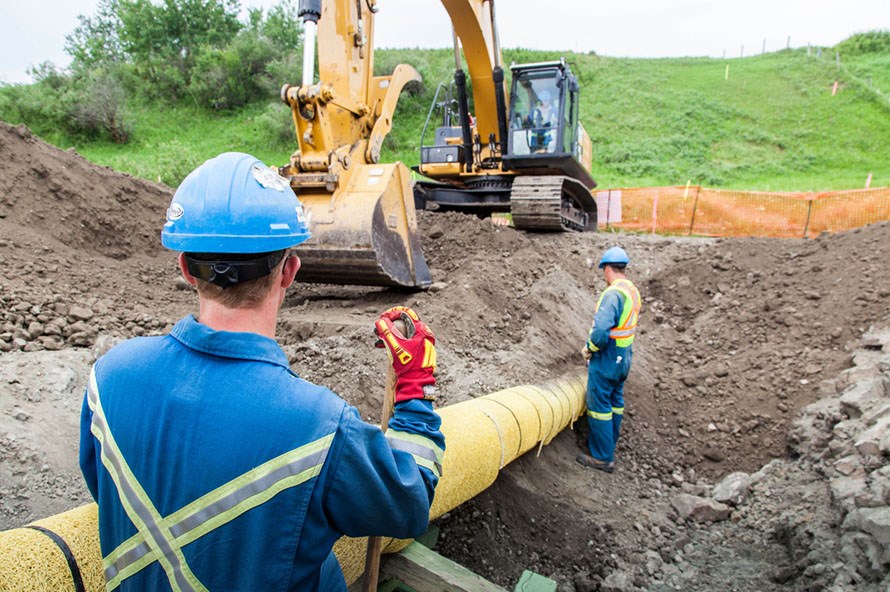Alberta’s recent objection to a new $1.4 billion pipeline from the northern B.C. gas fields is just the latest intrusion into a northern economy still staggered from cancellations of liquefied natural gas projects and threats to kill BC Hydro’s Site C dam.
The frustration is particularly close to the surface in the Northeast, which has the only oil and gas projects working in B.C. – those five projects a far cry from what was expected just two years ago.
Many locals blame southern press, environmentalists and politicians for helping to scuttle resource projects that the north provides and the provincial economy depends on.
“I would not say it’s just a bit frustrating; I would say it consumes our lives,” said Moira Green.
Green is the economic development officer for Fort St. John, the second-largest city in the north, a major natural gas hub and a city that nearly borders the $8.8 billion Site C dam.
A perceived threat to cancel Site C by the NDP provincial government in 2017 – a threat later taken off the table – stoked northern suspicion that southern politics trumps northern prosperity.
Green said it’s a never-ending source of discussion around Fort St. John, that elitist – read southern B.C. – sentiment towards projects like the Site C dam is negative, and backing resource investments for economic reasons is short-sighted and narrow-minded.
“It’s infuriating that we cannot be heard because we’re the provincials, the uneducated, the ‘how could you possibly know what’s good for us rural dwellers,’” Green said.
Many northerners also blame the provincial government for the pipeline-sparked trade war with Alberta. They see Alberta’s filing against the new gas pipeline as just the latest salvo it that battle, though both Victoria and Edmonton deny it.
In March, the Alberta government filed its objection over TransCanada’s $1.4 billion, 301 kilometre North Montney Mainline project that would run from the giant gas fields near Dawson Creek.
TransCanada is looking to build the repurposed pipeline to bring B.C. gas to markets in the East, as it originally planned to bring gas to the shuttered Pacific NorthWest LNG project on the northern B.C.
But B.C. also wants to levy a tariff on the pipeline that all those using it would have to pay. The Alberta stance is that the gas pipeline would be built to benefit B.C. gas producers, but that Alberta producers would be expected to help pay for it.
“This is all part of the politics around the oil pipelines,” said Dawson Creek Mayor Dale Bumstead of the latest interprovincial dispute. “It has just moved upstream.”
B.C. wants to restrict the flow of increased volumes of the product through the province, namely through the Trans Mountain expansion that would pipe Alberta bitumen to an export terminal in Metro Vancouver.
Alberta has already suspended electricity purchase talks with B.C., and had imposed a brief import ban on B.C. wine in protest.
Alberta’s energy minister said its stance against the Mainline gas project is unrelated.
“Our filing has nothing to do with the recent dispute with the government of B.C. This is about standing up for Albertans and our energy industry,” said a statement emailed from the office of Alberta Energy Minister Margaret McCuaig-Boyd.
“Our position is that rolled-in tariffs will result in subsidization beneficial to the B.C. North Montney extension project at the expense of existing Nova Gas Transmission Ltd. (NGTL) shippers. This negatively impacts our royalty income, taxes, and Albertans’ employment in the sector,” according to McCauig-Boyd.
Peace River South MLA Mike Bernier noted that Alberta hadn’t expressed opposition to the project until now.
“The trade war is expanding and the job losses are mounting. It is ridiculous that another project is being dragged into [B.C. Premier John] Horgan’s trade war,” Bernier said.
TransCanada had planned to start construction of the project this year, subject to regulatory approvals. It would give producers various options including deliveries to local distributors, Eastern Canada, the U.S. Midwest or California/Pacific Northwest. It would also pipe liquids needed to facilitate the flow of bitumen from the Alberta oilsands.
A 2015 study estimated the project would pump more than $800 million into the B.C. economy, including $8 million in property taxes to the Peace River Regional District. Construction is expected to create up to 2,500 direct jobs. TransCanada said it would also add a $2.4 billion expansion to its NGTL system to deal with the increased supply.
The National Energy Board approved the North Montney Mainline pipeline in April 2015, with conditions. B.C. granted the project an environmental certificate in January 2017.



